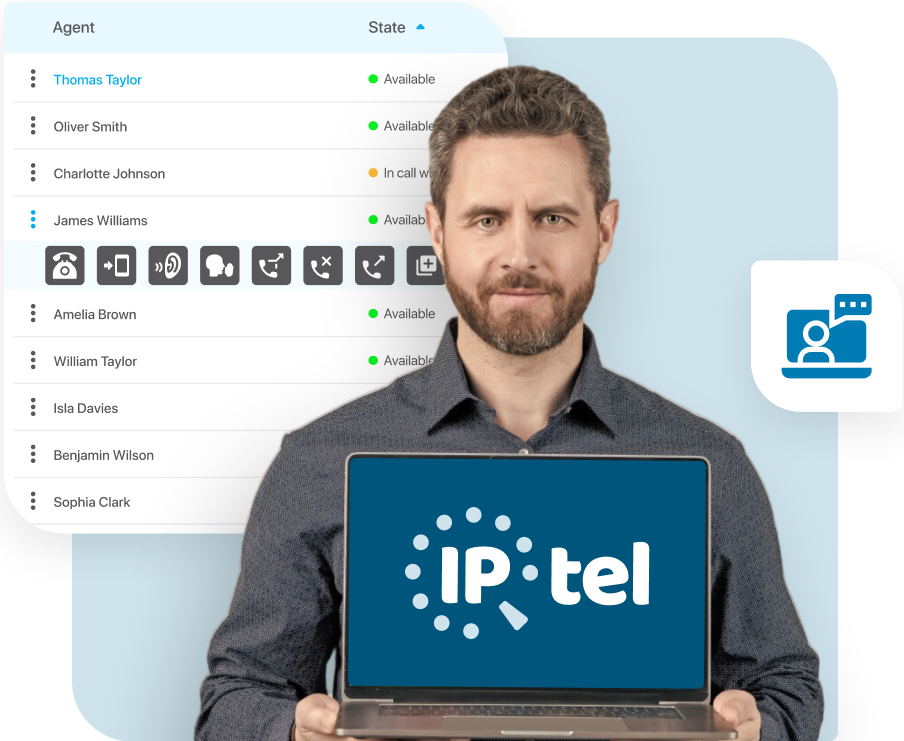Do you want to change the customer service approach in your company and improve your financial results?
Sign up for a demo call with our expert.


Deepfake voice fraud is becoming alarmingly real. What once seemed like a theoretical danger is now a pressing operational risk. So how can businesses protect themselves? IPTel’s AI security experts explain.
Imagine getting a call from your company’s CEO. You recognise the voice, the tone, even the familiar speech pattern. They urgently ask you to transfer a large sum of money — and you comply. Hours later, you find out the CEO never made the call. It was a fake, and the voice was AI-generated.
This isn’t science fiction — it’s a growing threat to UK businesses. Deepfake voice fraud is becoming alarmingly real. What once seemed like a theoretical danger is now a pressing operational risk. So how can businesses protect themselves? IPTel’s AI security experts explain.
According to a February 2025 study by Hiya, 26% of UK consumers encountered voice-based deepfake fraud in Q4 2024. Among them, 40% fell victim, 35% suffered financial losses, and 32% reported identity theft.
One of the earliest and most publicised cases occurred in 2019, when scammers mimicked the voice of a German parent company CEO, convincing the UK office manager to wire €220,000 to a fraudulent account.
Voice deepfakes go far beyond phishing emails or strange text messages. With today’s AI tools, criminals can recreate someone’s voice with astonishing accuracy — replicating tone, inflection, timbre, and even signature phrases.
A few years ago, this would have required specialist equipment and technical skills. Today, just a few minutes of audio — from a public speech, interview, or even social media clip — is enough to train an AI model to speak like you.
Fraudsters start by collecting audio of the target voice. Once the model is trained, they call the business, often posing as a CEO or senior figure. The request may seem urgent: a payment, a file transfer, access to internal systems. Everything sounds legitimate — the voice is familiar, the background noise is realistic, and the timing is critical.
Other times, the deepfake is used to damage reputation. An AI-generated recording might feature a senior executive making a controversial comment or leaking confidential positions. If such audio reaches the press or social media, the fallout can be immediate. People trust voices more than text. By the time the truth emerges, trust is already lost.
Another common use: obtaining confidential data. Impersonating a senior figure, fraudsters extract sensitive documents, client records, or financial reports — and the voice sounds so convincing that staff don’t think to question it.
In all these cases, deepfake attacks exploit two human instincts: trust in familiar voices and the urge to act quickly during emergencies. That’s what makes them both effective — and dangerous.
The rise in voice deepfakes has serious consequences for UK companies, including financial loss, reputational damage, and legal exposure.
A major 2024 incident involved British engineering firm Arup. A Hong Kong-based employee received a message — supposedly from the CFO — requesting a confidential transfer. To reassure him, a video call was arranged. On the call, he saw and heard colleagues he recognised.
In fact, the entire scenario was fabricated. Deepfake tech generated both the voices and visuals of the leadership team. The employee transferred HKD 200 million (approx. £2.5 million) across 15 transactions. The attack reduced Arup’s annual profit by 8% and forced a cut in employee bonuses.
Beyond financial losses, such events destroy trust. When it becomes public knowledge that a company was deceived by voice fraud, partners begin to question whether their data is safe. Clients may view the business as unreliable. Both outcomes can shrink the sales pipeline and stall growth.
Legal consequences can also follow. Companies failing to prevent such breaches may face lawsuits or data protection fines. In Arup’s case, even though the company stated that operations remained stable, the incident drew the attention of regulators and sparked demands for stronger security protocols.
In short, voice deepfakes are not just a technical risk — they pose a serious business threat.
Voice fraud is evolving rapidly. Traditional cybersecurity tools can’t detect whether the voice on the line is real. Businesses need proactive tools — and that’s where a Voice Fake Detector becomes critical.
This AI-powered system works in real time. It analyses acoustic signals, micro-intonations, and anomalies in speech to detect faked voices during a live call. If a red flag is triggered, the system warns the operator instantly — before any damage is done.
It’s especially important for businesses managing high-value transactions. A single fake call could cost thousands — or even millions — of pounds. But it’s not just about money. The ability to flag a suspicious call also protects your brand, team morale, and internal trust.
In today’s world, where any voice might be fake, real-time voice verification is no longer optional. Voice Fake Detector creates a secure communication environment — where your staff can act confidently and responsibly, knowing who they’re talking to.
IPTel offers an integrated platform to protect modern business communication. With built-in Voice Fake Detector, IPTel connects your telephony, messaging, and email into one interface — providing not just safety, but also efficiency and automation.
By deploying IPTel, your company gains stronger defence against voice fraud and cyber threats — all while streamlining internal communication and reducing operational risk.

Subscribe to our email subscription to be the first to know about new articles and insights.
Sign up for a demo call with our expert.

We've got your request and will respond via email or WhatsApp as soon as possible.
There was an error submitting the form, please try again
After receiving your request, we will contact you via chat or email as soon as possible.
We've got your request and will respond via email or WhatsApp as soon as possible.
There was an error submitting the form, please try again
Our manager will contact you shortly to help find the optimal solution.
Meanwhile, take a look at how we've already transformed the businesses of other companies — real case studies here.There was an error submitting the form, please try again
You’ll now receive the most valuable insights on cost optimization, improving call center performance, and effective life hacks for customer communication.
No spam — just useful content. Wait for your first email! 📩There was an error submitting the form, please try again